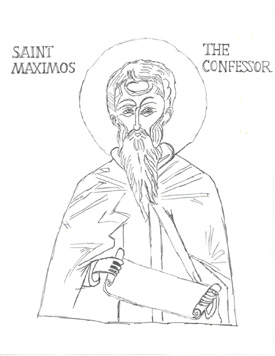
Saint Maximus the Confessor
Both these men, together with their staunch supporters, insisted that Jesus Christ must have two distinct and separate wills and actions, just as He has two distinct and separate natures in one person. The Holy Fathers insisted that there was one Son of God Who is one Son of Mary, but this one Son wills acts distinctly as God and as Man.
Christ has the fullness of the divine will, energy, action, operations, and power which is the same as that of the Father and the Holy Spirit. Christ also has the fullness of the human will, energy, action, operations, and power which is the same as that of every other human being. Salvation consists in the fact that Jesus Christ being a true human, freely and voluntarily submitted his human will (which is exactly the same human will that all men have) to His divine will which is the will of God). The divine Son of God became a real man with a real human will so that as a real man He could fulfill all righteousness in perfect, voluntarily obedience to His Father. It is through His genuinely human action that Jesus Christ frees all men from sin and death as the New and Final Adam.
Saint Maximus and Saint Martin suffered greatly for opposing the monothelite position. They were imprisoned, tortured, and mutilated by the imperial powers who wanted badly to use monothelitism as a way to reunion with the monophysites.
The Sixth Ecumenical Council
Ultimately, however, the doctrine of these saints prevailed. The Third Council of Constantinople, known as the Sixth Ecumenical Council, held in 680-681, officially verified their teaching and formally condemned both Patriarch Sergius of Constantinople and Pope Honorius of Rome, together with all who defended the false doctrine about Jesus that deprived Him of His genuine humanity.
Theological Writings
Saint Maximus the Confessor wrote also on spiritual and ascetical themes. His contemporary in Egypt, Saint John Climacus (d. 649) abbot of the Monastery of Saint Catherine on Mount Sinai, wrote the classical work on the spiritual life the Ladder of Divine Ascent. Saint Andrew of Crete wrote his penitential canon in the 7th century which is still read in the Orthodox Church during Great Lent.
Saint Maximus is important to me because he established a long held understanding that Mary gave birth to the triune principle in her son, Jesus. And more importantly, Saint Maximus established the fact that Jesus is the incarnation of the Word as well as one with us in humanity, the two natures of Jesus. Which leads us to the acceptance that we are also of two natures.
Adapted from: Hopko, Father Thomas. The Orthodox Faith, vol iii, Bible and Church Hisotory. New York: Orthodox Church in America, pp. 147-148.
Copyright © 2003-2009 Father Maximus Gregorios
All Rights Reserved